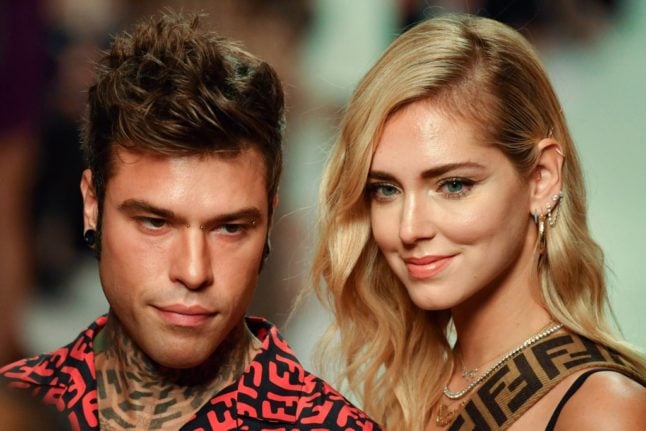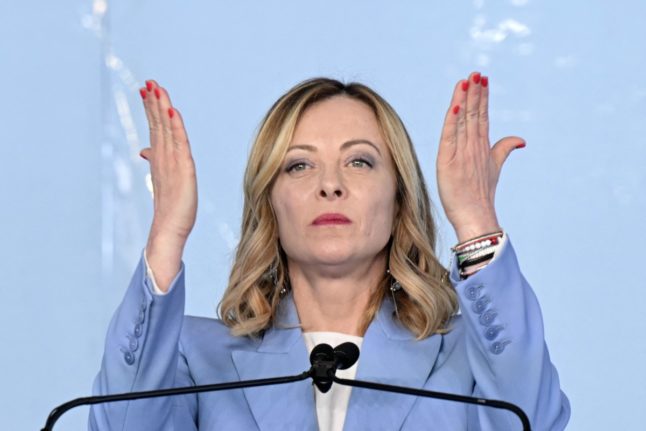The scandal, in which Rai managers appeared to try to dissuade rapper Fedez from criticising far-right politicians during a May Day concert, has reignited longstanding questions about neutrality and political pressure at Rai.
Politicians and media groups have stepped up calls for reform of the top management of the publicly-funded broadcaster, which is named by government ministers.
Rai’s current president, Eurosceptic journalist Marcello Foa, was picked for the top job by the League.
READ ALSO: Salvini backs conspiracy theorist as head of Italian state broadcaster
“For years we have been denouncing a ‘system’ at Rai: it’s the party-ocracy, which with alternating parties occupies the public service,” the USIG union of Rai journalists said.
“Let Rai be free, let ideas, information and art be free.”
Fedez, who has over 12 million followers on Instagram and is married to star blogger Chiara Ferragni, used his appearance at a televised May 1 concert to denounce Italy’s far-right League and its blocking of an anti-discrimination bill in parliament.
Before reciting a litany of anti-gay public comments by members of the League – including by one who said that “If I had a gay son, I would burn him in the oven” – Fedez told fans that Rai had attempted to silence him ahead of the concert.
When Rai denied it, Fedez published a recording of a phone conversation in which the concert producer said Fedez must “adapt to a system” that precluded him from naming names.
La Rai smentisce la censura.
Ecco la telefonata intercorsa ieri sera dove la vice direttrice di Rai 3 Ilaria capitani insieme ai suoi collaboratori mi esortano ad “adeguarmi ad un SISTEMA” dicendo che sul palco non posso fare nomi e cognomi pic.twitter.com/gu14BxM3G6— Fedez (@Fedez) May 1, 2021
In the same call, the vice director of the Rai3 channel said she considered the context “inappropriate” for the rapper’s planned comments.
Rai later said the video had been edited to remove statements by the broadcaster’s executive saying that Rai was not censoring him.
However, it has since received about 2.2 million views and prompted some politicians, including former prime minister Giuseppe Conte, to voice support for Fedez.
Io sto con #Fedez. Nessuna censura. pic.twitter.com/Dr1JWjiHwN
— Giuseppe Conte (@GiuseppeConteIT) May 2, 2021
The story was front-page news in Italy on Monday, with La Repubblica splashing “Fedez cyclone over Rai” on its front page.
The president of the lower house of parliament, Roberto Fico, called for Rai to put “competence and independence at the forefront”.
Independence at the public broadcaster is a long-running controversy in Italy.
The media landscape was upended by former premier and media mogul Silvio Berlusconi, whose Mediaset conglomerate helped cement his grip on power.
READ ALSO: Six key things to know about press freedom in Italy
A 2015 reform under former premier Matteo Renzi, supposed to free Rai from political influence, merely transferred the power to nominate top managers from parliament to the cabinet.
Under new prime minister Mario Draghi, media watchers expect a shakeup to occur in July.
That could include the exit of CEO Fabrizio Salini, who has struggled to reverse declining advertising revenues and rising debt.
Rai is the most-watched broadcaster in Italy, with about 36 percent of viewership.
But its position depends on ageing viewers, and is challenged by pay-TV platforms, such as Sky Italia, as well as No. 2 competitor Mediaset.
Rai president Marcello Foa, a supporter of Vladimir Putin who has posted conspiracy theories online, was the choice of League head Matteo Salvini.
He was appointed in 2018, when the party shared power with the populist Five Star Movement.
Although a parliamentary commission at first rejected Foa’s appointment, the ruling coalition pushed it through against the wishes of the then opposition Democratic Party – who are now in government.
READ ALSO:Italian TV show investigated after outrage over ‘sexy shopping’ tutorial
Rai’s code of ethics published on its website lists as priorities: “freedom, completeness, transparency, objectivity, impartiality, pluralism and fairness of information.”
The broadcaster’s budget comes from advertising and a license fee paid byItalian households.
The latest outcry comes just days after the broadcaster said it would no longer allow “blackface” on its channels.
The practice of white performers painting their faces to portray black characters, long banned in many European countries, occurred recently on one of Rai’s weekly variety shows.



 Please whitelist us to continue reading.
Please whitelist us to continue reading.
The lefties are jumping about with joy over this.